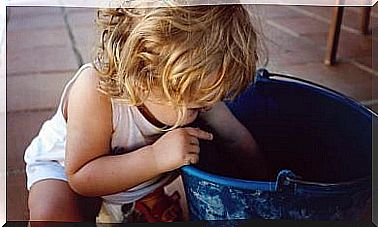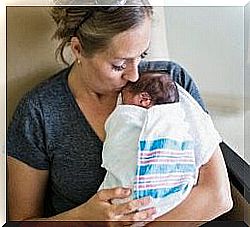Is It Normal For Babies To Sleep A Lot?

In this article we discuss: Is it normal for babies to sleep a lot ?
The reasons babies sleep a lot have a lot to do with their growth and development.
A newborn baby sleeps between 16 and 18 hours a day with an interval of two to three hours. They usually wake up because they are hungry or because they want their diapers changed.
Then they go back to sleep. As they grow, the intervals between sleep phases increase.
Although every child’s sleep rhythms are a little different, it’s important to establish a routine from a young age.
Some babies sleep more than others because their stomachs can absorb and retain more milk. In addition, children who are lighter have to eat more often.
Is it normal for babies to sleep a lot?
Yes, it is normal for babies to sleep a lot and, moreover, it is highly recommended. Sleeping improves the baby’s physical and cognitive performance. The hours of sleep are directly related to the child’s development.
As long as babies sleep a lot, their neurons, organs and the immune system are strengthened.
Next, let’s look at the benefits of sleeping in babies:
- Sleeping makes you strong. A baby will put on weight faster if you sleep a lot. In addition, restful sleep helps stimulate the little ones’ appetite.
- Promotes cognitive development. As babies sleep, they check in their heads what they have learned during the day: colors, figures, textures, faces, etc. This learning encourages them to continue to acquire knowledge and to explore more of their surroundings.
- More sleep means better growth: Growth is related to the hours of sleep, because hormones are activated during this rest period. That is why it is particularly important to watch the baby’s sleep.

The baby sleep cycle
Like adults, babies also have a sleep cycle that is divided into phases of varying depth. Typically, babies stay in a REM sleep cycle for the first few months of life . Strong eye movements can be seen at this stage of sleep.
REM sleep is linked to brain activity, which suggests that the baby is dreaming vividly.
There is also evidence that memory is boosted during this cycle, although there are currently no proven studies.
As they grow, babies move from this type of sleep to longer and deeper cycles. From the age of 3, your sleep is regulated, especially at night. During the growth phase, children can sleep more than 10 hours.
This is how you promote your baby’s sleep
Creating a comfortable and cozy environment is the best way to encourage your baby to sleep in the early stages.
Make sure your baby is always clean before you put him to sleep. Also, don’t wake your baby to feed. If it is hungry, it will wake up on its own.
After a few weeks it is important to get your baby used to day and night. In this way it can learn to distinguish and internalize the habits of the day and night.
During the day, the baby should remain active and the house should be lit. At night it is advisable to keep the surroundings dark and still.
As children get older, it is advisable to put them on a sleep routine so that they develop a healthy and natural bedtime habit.
This routine consists of eating, bathing, and going to bed at the same time each day.

What to do if the baby doesn’t sleep so much
Not all babies have the same sleep pattern. Some don’t sleep as much as others or don’t sleep as often. If you have any doubts about your baby’s sleep cycle or sleep pattern, the first thing you should do is ask your pediatrician.
There are some signs that the baby is not sleeping much. The most obvious symptom is that the baby is sleepy for most of the day.
The baby’s skin may also become pale or there may be significant weight loss.
All of these symptoms will be considered by your pediatrician to determine if there is a problem that could indicate an illness.
The pediatrician will advise you of any changes or the specific treatment you should follow.









